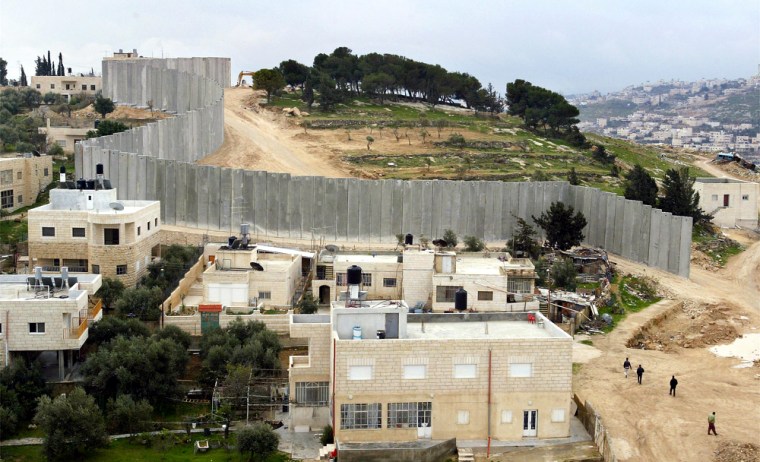Israel announced Thursday that it won't attend world court hearings on the West Bank separation barrier it is building, arguing that the judges don’t have the authority to rule on the controversial fence.
Palestinian officials said Israel’s decision is an admission that the barrier is illegal and indefensible.
Israel won’t remain entirely on the sidelines in the closely watched case, which begins Feb. 23 at the International Court of Justice in The Hague, Netherlands. The Foreign Ministry is dispatching representatives, hundreds of Israeli demonstrators plan to fly in, and an Israeli rescue service is sending the skeleton of a Jerusalem bus mangled in a Palestinian suicide bombing.
Israel says it needs the barrier — fences, trenches and walls that could run for up to 440 miles — to keep out Palestinian attackers.
The Palestinians say the barrier constitutes a land grab, since it cuts deep into the West Bank at points to include several Jewish settlements on the “Israeli” side, and it disrupts the lives of tens of thousands of Palestinians who can’t reach jobs, schools and farmland.
Wall's route reportedly changed
Israel’s Channel Two TV reported Thursday that Prime Minister Ariel Sharon has decided to shorten the planned route and that the settlements of Kedumim, Emmanuel and Karnei Shomron would be left on the “Palestinian” side of the barrier. The route of the barrier near Ariel, the second largest West Bank settlement, remains unclear, the report said.
Justice Minister Yosef Lapid, leader of the moderate Shinui Party, said he proposed to Sharon to shorten the barrier by nearly one-third, to save money and construction time. “I understand that the prime minister has accepted this position, although I’m not sure he’s accepting precisely what I’m advising,” Lapid said.
Sharon’s office confirmed the prime minister is considering changes in the route but would not elaborate.
In December, the U.N. General Assembly asked the world court, its highest tribunal, to issue an advisory ruling on the legality of the barrier. Israel and the Palestinians attach great importance to the case, because a ruling could set the stage for a binding U.N. Security Council decision.
So far, 44 U.N. member states, as well as the Palestinians, the Arab League and the Organization of Islamic States, have submitted briefs.
Israel’s challenge to the court’s authority to argued that the issue is being manipulated for political ends. Israel says the United States, Britain, Germany, Australia and Canada and others have presented similar arguments.
Sharon, Cabinet ministers made decision
The decision to stay home was made Thursday by Prime Minister Ariel Sharon and five senior Cabinet ministers.
Alan Baker, the Israeli Foreign Ministry legal adviser, said that “after having examined all the written statements that were submitted by other countries, Israel does not feel it has anything to add.”
The Israeli rescue service ZAKA said it is flying the charred frame of a Jerusalem bus blown up by a Palestinian suicide bomber to The Hague. Eleven people were killed and dozens wounded in the bombing last month.
ZAKA members collect remains of victims in the aftermath of suicide bombings. The rescue service said ZAKA volunteers would deploy outside the court, alongside the bus, and talk to passers-by about their work.
An Israeli grass roots group, meanwhile, is arranging for discount flights to The Hague for Israeli demonstrators. Shahar Ervin, the director of the group, the Citizens Coalition, said more than 600 have approached him in the last two days.
Palestinian officials said Israel’s decision not to go was an admission of failure.
“This is a recognition that the Israelis cannot face the international community and international law and justice,” said Nabil Abu Rdeneh, an adviser to Palestinian leader Yasser Arafat.
The Palestinians will argue before the court that the barrier is illegal because it is built on occupied land. Israel seized the West Bank and Gaza Strip in the 1967 Mideast war. It began building the barrier in response to an onslaught of suicide bombings that have killed hundreds of Israelis since 2000.
